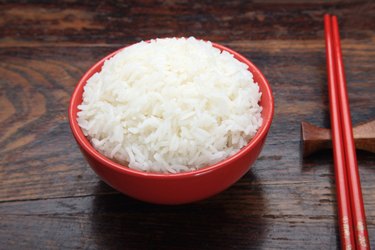
A delicious curry or stir fry served with some white rice can be pretty hard to pass up. However, if you're trying to monitor your sugar intake, here's what you need to know about the amount of sugar in white rice and its nutrition profile.
Video of the Day
Video of the Day
Sugar in White Rice
Rice is a carbohydrate. When you eat carbohydrates, your body breaks them down into sugar, which then enters your bloodstream and raises your blood sugar level. According to the USDA, a 100-gram serving of long-grain white rice has only 0.05 grams of sugar, but it contains 28.17 grams of carbohydrates, which your body converts into sugar.
Other varieties of white rice like short- and medium-grain white rice also have approximately 28 grams of carbohydrates per 100 grams. Glutinous white rice has a slightly lower carbohydrate content of 21.09 carbohydrates per 100 grams.
White Rice Nutrition and Fiber
White rice has a lot of carbs and not a lot of fiber because it is a refined grain, unlike brown rice, which is a whole grain. When white rice is refined, its bran and germ are stripped away, leaving only the endosperm. Apart from fiber, the refinement process also strips away a lot of white rice's nutrition; however, some of the vitamins and minerals are added back.
Brown rice, on the other hand, contains the whole rice grain, including the bran, which has a lot of fiber. Fiber slows down the rate at which the food you're eating is converted into blood sugar, thereby helping regulate your blood sugar levels.
White Rice and Diabetes
Having diabetes means your body is not able to regulate blood sugar as efficiently as it is supposed to, so you need to be more mindful than most of the foods you eat and how they affect your blood sugar level. The glycemic index is a scale that helps you measure how slowly or how quickly a certain food will raise your blood sugar levels.
According to Harvard Medical School, white rice, like other refined grains that don't have much fiber, has a fairly high glycemic index of 73. In comparison, brown rice has a slightly lower glycemic index of 68. The highest value on the scale is pure glucose, which has a glycemic index of 100.
The high glycemic index means the sugar in white rice reaches your bloodstream pretty quickly. Eating white rice, therefore, has almost the same effect on your blood sugar level as eating pure table sugar, notes Harvard Medical School, because it causes a quick spike in your blood sugar. What you want instead is a slower, more gradual release of sugar into your bloodstream.
Recommended Rice Intake
So should you be eating white rice at all? The USDA recommends cutting down your consumption of refined grains like white rice, white bread, pasta, pizza crust, tortillas and crackers and opting for more whole grains instead. Whole grains include whole-wheat breads, oatmeal, popcorn and brown rice.
Contrary to popular belief, having diabetes doesn't mean that you can't eat carbs; it just means that you need to be mindful about the carbs you're eating, according to the Cleveland Clinic. According to Harvard Medical School, opting for good sources of carbs can help you manage your blood sugar levels better, in addition to helping you manage your weight and preventing chronic diseases.
You should definitely try and avoid white rice if you have diabetes, and switch to a whole grain like brown rice instead. If you are eating white rice, Diabetes UK recommends limiting your portion size to 2 heaped tablespoons of cooked rice.
- Harvard T.H. Chan School of Public Health: “Carbohydrates and Blood Sugar”
- USDA: “Rice, White, Long-Grain, Regular, Enriched, Cooked”
- USDA: “Rice, White, Short-Grain, Regular, Enriched, Cooked”
- USDA: “Rice, White, Medium-Grain, Regular, Enriched, Cooked”
- USDA: “Rice, White, Glutinous, Unenriched, Cooked”
- National Institutes of Health: “Diabetes”
- Harvard T.H. Chan School of Public Health: “Rice”
- Harvard Medical School: “Glycemic Index for 60+ Foods”
- Harvard Medical School: “A Good Guide To Good Carbs: The Glycemic Index”
- USDA: “2015-2020 Dietary Guidelines for Americans”
- Cleveland Clinic: “Carbohydrates and Blood Sugar Control for People with Diabetes”
- Diabetes UK: “Portion Sizes and Diabetes”
- The Huffington Post: 5 Ways With Leftover Rice